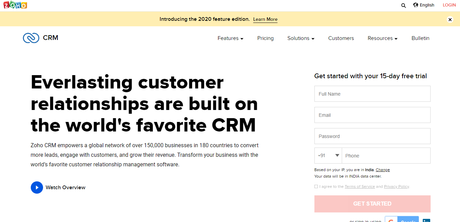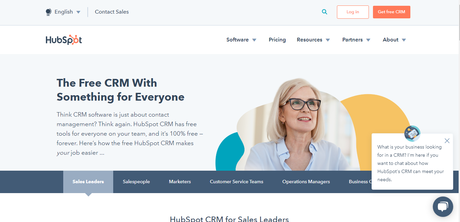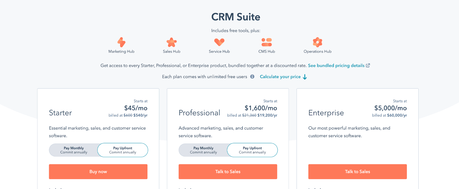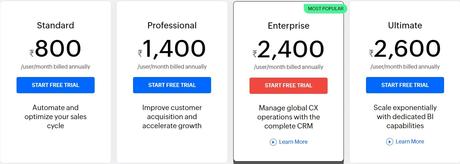HubSpot vs Zoho contrasts two customer relationship management (CRM) technologies that help your organization achieve success.
Insights indicate that CRM software is the corporate software market with the highest growth rate because CRM systems can target four company areas with a single effective instrument.
CRM software may perform customer support, marketing, sales, and commerce functions.
Due to its software-as-a-service (SaaS) features and enhanced accessibility, cloud-based CRM applications have grown in popularity.
By definition, HubSpot and Zoho cater to these benefits. And although they share comparable capabilities to empower your customer-facing personnel, these systems vary in adaptability to match your business's requirements.
Let us compare both HubSpot and Zoho in detail.
What Is Zoho CRM?

Zoho is a customer relationship management (CRM) tool for managing leads and client connections. Its user interface (UI) provides sales teams with marketing automation and help desk support features.
Product configuration, reporting, and consumer analytics are other essential platform functionalities.
Email marketing is another well-liked Zoho product that has matured with each passing year. Associated email integration and email insights contribute to the success of this service.
Zoho is a central repository for your sales, marketing, and customer support activities.
What Is HubSpot CRM?

HubSpot Sales Hub, HubSpot Marketing Hub, HubSpot Service Hub, and, more recently, HubSpot Operations Hub are all components of the HubSpot platform geared toward improving your company.
HubSpot CRM, however, is a free solution designed to improve customer interactions without adding complexity to your company processes.
HubSpot's ability to link its CRM product to the rest of its ecosystem is one of its powerful features.
You can efficiently manage your staff and even improve specific procedures with workflow automation.
Difference Between Zoho and HubSpot
The primary distinction between HubSpot and Zoho is that Zoho caters to small and medium-sized businesses, whereas HubSpot is suitable for companies of all sizes. The free Hubspot CRM is a top pick for individuals with minimal requirements, while its Sales Hub premium services are ideal for those with more complex needs.
Zoho is far more affordable than HubSpot. Its premium plans range from $18 to $55 per user per month, while HubSpot's paid Sales Hub plans vary from $45 to $1,200 per month.
However, the HubSpot Sales Hub's extensive features justify its high price. Learn more about this CRM tool by reading my HubSpot review.
Additionally, HubSpot expects a one-year commitment. You may opt to pay monthly, but a one-year membership commitment is required. With Zoho CRM, cancellation is possible at any moment.
HubSpot's free CRM offers email marketing tools. However, Zoho's free users do not have access to this capability. My review of Zoho provides a comprehensive summary of its features.
Why Do I Recommend Zoho Over HubSpot?
What good is an extensive client database if it is not accessible at any time and from any location? When it comes to CRM data, you must be able to access, amend, and add new information instantly.
Mobile -This is particularly true for sales representatives, who are often on the road, engage with dozens of clients daily, and must maintain control of their schedules.
While HubSpot's mobile app provides access to all your critical CRM details, Zoho takes a step further by integrating artificial intelligence and analytics into the mobile experience.
What Zoho Offers -
What HubSpot Offers -
- Activity feed: Keep track of the most recent actions involving your emails, online visits, documents, and more.
- Conversations: Communicate with prospects and clients and address their inquiries and concerns.
- Access records and tasks: Work with contact, corporate, and transaction data, as well as organize and plan projects.
- Inventory management: Tracking and managing transactions for each product line may be complex for businesses that deal with several product lines. Incorporating your product inventory into your CRM offers a consistent and effective method for generating estimates and closing sales. This also allows you to create better reports and analytics for a more detailed analysis of your company's performance. Both HubSpot and Zoho provide the ability to create a product catalog, set rates for unique transactions, and generate sales quotations.
What Zono Offers -
- Discount options: You can apply discounts to specific transactions more freely since both absolute and differential discount models are available.
- Orders, invoices, and vendors: You may transform your bids into invoices or sales orders and manage a database of your suppliers and purchase orders.
What HubSpot Offers -
- Products and quotes: HubSpot enables you to store product information in a product library and correlate it with offers. You may choose from various quotation templates that can be shared through a unique URL.
- Collaboration: Whether negotiating a transaction or resolving a client concern, everything in your company is a team effort. If communication between team members is sluggish or delayed, it may harm revenue and consumer opinion of your business. A CRM should allow meaningful user interactions and advance any collaborative endeavor. Both Zoho and HubSpot enable users to tag team members in documents and comments and coordinate calendar appointments. In addition, Zoho offers special team collaboration feeds. Another facet of cooperation is the capacity to interact with third-party stakeholders and provide them access to and modify important information. This ensures that the data in your CRM remains current and relevant.
What Zoho Offers -
What HubSpot Offers -
- Team communication: Team members may tag one another in historical notes and comments and engage in private context-based dialogues inside their shared team mailbox.
- Calendar integration: While HubSpot does not include a calendar by default, the Meetings feature enables customers to link their O365 or GSuite calendars. Free edition calendar booking is limited to a single, non-customizable link.
- Marketing automation: Zoho provides marketing automation software solutions but does not prevent marketing elements from including in Zoho CRM. HubSpot has independent marketing and sales hub. While I agree that HubSpot Marketing Hub's feature set is significantly more extensive, Zoho CRM offers several lead-generating and nurturing functions, including those that Marketing Hub does not provide. If you already use Marketing Hub and seek a CRM, you may import your leads directly into Zoho using HubSpot's plugin.
What Zoho Offers -
What HubSpot Offers -
- Marketing vs non-marketing contacts: Pricing for Marketing Hub is dependent on marketing contact levels. In addition to marketing contacts, your CRM database may include hundreds or thousands of non-marketing contacts. This may make it tough to combine your CRM and marketing data.
- Marketing Hub features: Marketing Hub enables you to handle several areas of your inbound marketing campaign, including A/B testing of your website, social profile management, and ad management.
- Artificial intelligence: Artificial intelligence transforms your CRM from a mass of data into a gold mine of insights and forecasts. An AI may analyze the data in your CRM, learn from it, identify anomalies and patterns, and even provide predictions and business-improvement recommendations. Zia, Zoho's intelligent AI assistant, is equipped with various tools to help you better understand your consumers and their preferences. HubSpot has a few AI tools, but they are not as advanced as other platforms.
What Zoho Offers -
What HubSpot Offers -
What Zoho Offers -
- Intelligent anomaly detection: Identify deviations from anticipated sales patterns and implement corrective measures to get sales back on track.
- Wide range of report types: Custom reports are available to all users of the subscription version and provide a variety of choices. From bar and pie charts to intricate quadrant and cohort analysis, Zoho CRM can answer any query about your sales data.
What HubSpot Offers -
- No analytics on mobile: Salespeople must be able to access reports on the move, but this is not achievable with HubSpot's basic mobile app.
- Scheduled reports: You may arrange the emailing of report dashboards at regular times. Reports cannot be scheduled individually.
- Custom reports: You may generate bespoke reports based on your sales data using HubSpot. They are exclusive to the Professional version and above, and hub-wide constraints apply.
- Customization: Creating standard procedures inside your CRM is excellent, but being able to configure it according to your unique company needs takes it to the next level. Each firm has a distinct method of operation, which must be reflected in its CRM. Whether it's the product's appearance or the accessible modules and fields, the CRM should conform to the organization's structure and not the other way around. Zoho offers a great deal of freedom in structuring your CRM. HubSpot provides particular customization possibilities, but most are restricted to premium versions.
What Zoho Offers -
What HubSpot Offers -
What Zoho Offers -
What HubSpot Offers -
What Zoho Offers -
What HubSpot Offers -
Zoho Vs HubSpot Pricing


As you can see, Zoho pricing plans are much cheaper compared to HubSpot, and we can clearly say that Zoho is the winner when it comes to pricing. It also has better features at a relatively lower price.
What's the best CRM for real estate?
Numerous real estate professionals utilize the Zoho CRM. Although HubSpot was not explicitly designed for the real estate industry, it may be an excellent CRM for realtors.
What is the Best CRM for a small business?
Zoho CRM is better for small enterprises. Zoho's attractiveness to small companies is bolstered by its affordable pricing, simple contact management, and rapid setup.
What are the benefits of a CRM?
CRM provides the capacity to segment customers, customize outreach, consolidate and manage lead, customer, and partner data, anticipate sales trends, scale internal and external communication, automate processes and data input, and identify actionable customer data patterns. These advantages enable businesses to provide better lead and customer experiences, increasing lead conversion rates and customer lifetime values.
What is the difference between Zoho CRM and HubSpot?
Zoho CRM and HubSpot offer free subscriptions with complete contact and lead tracking capabilities. HubSpot's premium plans, which include a vast array of marketing and sales tools, tend to be costly, while Zoho's less feature-rich plans are more reasonably priced.
Conclusion: Zoho Vs HubSpot 2022
Quick Links:A CRM is not only about the software's power; it also demands talent to configure it to match your business's requirements. For this reason, every CRM provider must provide various services to support their clients, assist them with onboarding and training their users, and even counsel them on business strategies to increase lead and revenue creation.
Zoho and HubSpot have significant user communities and provide email, phone, and live chat customer service. Zoho also offers a client portal via which customers may make requests and monitor their progress. The following table details the availability of several services:
A CRM is just one component of the ecosystem of business software. Given that each organization's structure and requirements are unique, there must be a means to include bespoke functionality for the ecosystem's components to perform smoothly together.
The extent to which they can do this relies on the power and adaptability of each application's development tools. HubSpot and Zoho provide various developer tools and specific developer editions that allow customers to create their applications and connections. Zoho's developer tools are far more extensive and give you everything you need to work with your CRM data and enhance compatibility with other applications.
After all this, I would recommend Zoho.
